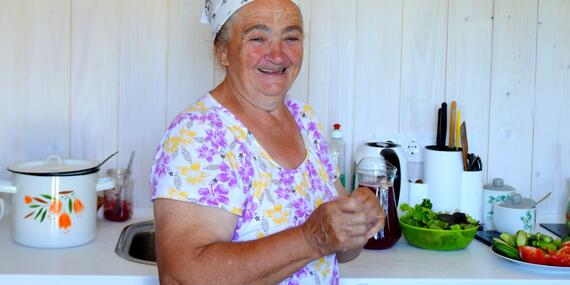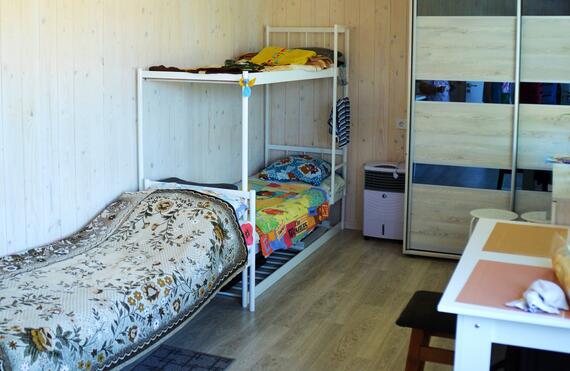Ukraine: New beginnings in Chernihiv

By Hilary Stauffer, OCHA Ukraine
“No, stay! You must eat something! Please, it’s from the garden!”
As we stood in the doorway of Lydia’s new home in Novoselivka, in Ukraine’s Chernihiv Region, she stood nearby, gesturing to the counter covered with platters of brightly coloured vegetables. Our visit was facilitated by Rokada, a Ukrainian non-governmental organization that is helping to rebuild shelters for war-affected people in Chernihiv.
Rokada had arranged our visit with Lydia in her new modular home, which, in the Ukrainian context, is a small, prefabricated mobile unit given to people whose houses were destroyed during the war. We were running a tight schedule, with several other site visits lined up, but Lydia’s enthusiasm encouraged us to stay a bit longer. While we didn’t have enough time to sit down for a full lunch, we indulged in some of her garden’s produce, paired with uzvar — a dried fruit compote beloved by many Ukrainians.
As we ate, Lydia narrated her story.
Novoselivka village was one of the first to be affected by Russia’s invasion of Ukraine on 24 February 2022. While the village was under military control of the Russian Federation, the area was heavily bombed and most of its homes were destroyed. Novoselivka was one of the first villages to be retaken by Ukrainian forces a few weeks after the invasion. However, the scale of destruction is so vast that more than a year later, it appears as if the fighting ended only recently. The skeletons of ruined homes stretch in every direction.
Lydia recounted the harrowing weeks after the invasion — seeking refuge in a neighbour’s basement with 17 others before escaping to Chernihiv city and, later, Ternopil. But she missed her hometown and the family and friends she left behind. When she eventually returned, in May 2022, she was confronted with the painful sight of her home reduced to rubble. She moved among family and friends for a year, staying the longest with her daughter, who lived nearby.
Lydia is grateful for the support, but the constant moves were challenging; she has limited mobility, and many of the places she stayed in were not adapted for someone with a disability. She was also under constant stress through worrying about the future, as she lost everything during her displacement — not only her home but important civil documentation. Her mental health deteriorated with each passing day.

Housing needs
Rokada representatives explained to OCHA that Lydia’s housing needs and concerns about her mental and physical health led them to identify her as a priority person to receive a modular home. These homes are more expensive than other shelter options and are in limited supply. The preferred modality for shelter repair in Ukraine is self-repair, where possible. Humanitarian partners provide cash, vouchers or supplies to homeowners to carry out their own renovations, which gives affected people more flexibility and choice. However, such methods work only for light-to-medium repairs, such as broken windows, doors or roofs. For more extensive damage, alternative solutions must be found.
The Kyiv School of Economics, a Ukrainian university, estimates that nearly 7,000 housing units were damaged or destroyed in the Chernihiv Region, with an approximate repair bill of US$1.8 billion. The estimated housing damage and loss in Chernihivska Oblast amounts to $1.919 million, according to Ukraine: Rapid Damage and Needs Assessment, jointly prepared by the World Bank Group, the Government of Ukraine, the European Union and the United Nations.
Between 2022 and 2023, more than 140,000 people in Chernihiv have received shelter support, according to an estimate by the global humanitarian team leads on shelter and non-food aid items. Rokada has so far provided 16 modular homes to Chernihiv residents. In parallel, it has carried out light-to-medium repairs on 1,400 homes in the region since March 2022, and it plans to give building materials to an additional 400 homeowners for self-repair.
Chernihiv’s reconstruction needs are overwhelming, but every little bit helps. Lydia seemed immeasurably grateful for the assistance received.
Politely declining her offers of coffee and cake, we stopped to admire the thriving garden outside her new home — a testament to her resilience and the ongoing recovery efforts in Chernihiv.
